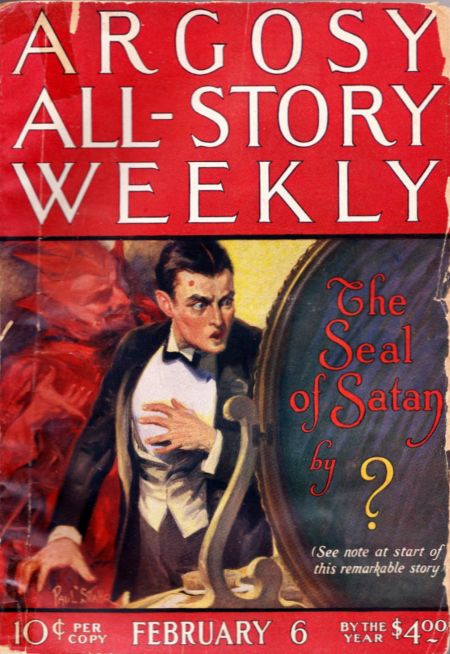The February 6, 1926 issue of Argosy All-Story Weekly featured four serials, including the start of The Seal of Satan, one novelette, five short stories, and five poems. I skipped the serials, as per my usual practice when I lack all the parts, but I read the remaining content. I found it another good issue, worth the time to read.
Claussen’s Valley, by Charles Wesley Sanders, is an odd western novelette in which a young man stumbles into a strange situation at the home of a bitter old man (Claussen) noted for his readiness with his guns. Through the course of one rather busy night, various parties, including the young man, the young woman he found at Claussen’s home, the woman’s father and brother and their men, Claussen’s son, and local farmers who bought their land from Claussen move back and forth between a few fixed points as events seem headed for a showdown owing to Claussen’s hard dealings with the man who bought his ranch (but neglected to ensure water rights were included).
In “Ten Days’ Free Trial,” by Gordon Stiles, a busybody maiden aunt sows suspicion after she overhears conversations that seem less than innocent. There’s not much too this one, and I can’t say I particularly liked it. Scotty is a drunkard shipyard worker who shows a streak of heroism in Edgar Daniel Kramer’s story of the same name, while in Charles Francis Coe’s amusing “Socker Dooley in the Movies,” an ex-pug down on his luck gets his break into filmdom. A construction site is the setting for William F. McMorrow’s “Solid Concrete,” in which an ambitious young builder faces the defeat of his plans at the hands of a schemer; a surprising turn of events provides an effective ending for the story. Finally, John H. Thompson’s “Easy Come; Easy Go” is a quick little story about two hobos who find themselves saddled with an abandoned baby. This last reads like the protagonists are continuing characters, but I can’t confirm that.
As usual, the poems are fine but nothing particularly outstanding.

